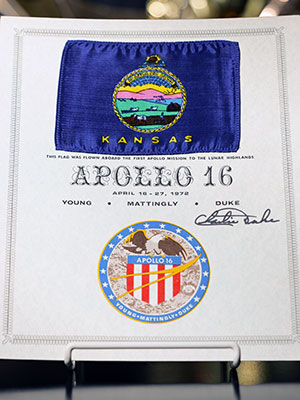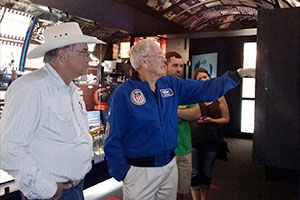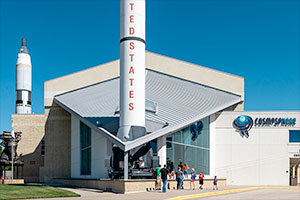February 11, 2025 — A collection of 15 well-traveled Kansas flags now have a home in the state they represent after living up to the Latin motto printed on their fabric: "Ad Astra per Aspera," or in English, "To the Stars Through Difficulties."
The small azure banners, which are adorned with the state seal and a sunflower, were flown to the moon and back by NASA astronaut Charlie Duke on NASA's Apollo 16 mission in April 1972. Almost 53 years later, Duke has donated them to the Cosmosphere, a world-class space museum and international science center located in Hutchinson, Kansas.
"We are grateful to General Duke for this generous contribution," said Jim Remar, chief executive officer of the Cosmosphere, in a statement. "Tangible artifacts that have been to the moon strengthen the connection between present and past, solidifying historic events in our collective memory."
Carried on Apollo 16, the fifth mission to land astronauts on the moon, the 6-by-4-inch (15-by-10-centimeter) nylon flags were among the mementos that Duke took with him on the journey. They were stowed in Duke's personal preference kit (PPK) that he brought onto the lunar module "Orion" for his and John Young's descent to and time at the Descartes Highlands, according to the Cosmosphere.
Additional flags, including more representing Kansas, were aboard the Apollo 16 command module "Casper," including at least two others that were part of a pair of NASA "flag kits" that each included "25 flags of the United States, 50 individual state flags, flags of United States territories, flags of other national states which are generally accepted as independent in the world community and flags of the United Nations and other international organizations," per NASA's press kit for the Apollo 16 mission.
The other Apollo missions carried similar flag kits, as did other Apollo astronauts carry state flags in their PPKs.
The donation announced on Tuesday (Feb. 11) was at least the second time that Duke gifted the Cosmosphere with moon-flown Kansas flags. He earlier presented the museum with 10 such flags, as reflected in a 2003 museum inventory.
Born in North Carolina, Duke has not lived in Kansas, nor was he stationed there while serving in the U.S. Air Force. He has been a long-time supporter of the Cosmosphere, though, which was founded in 1962 and is the only Smithsonian affiliate museum in the state.
The Cosmosphere did not disclose the value of Duke's donation. For comparison, though, an Apollo 16-flown Kansas flag mounted to a certificate inscribed by Duke sold for $1,755 in 2016. More recently, in December 2024, another flown Kansas flag originally from Duke's collection commanded $4,500 at auction, though it was framed with a long handwritten letter from the Duke describing his experience as the tenth man to walk on the moon.
It is not known how many Kansas flags Duke flew in total, or how many were flown to the moon during the Apollo program (Duke's Apollo 16 lunar module PPK held 350 flags, but a count by type has not been made public).
Two additional Kansas flags that were launched on the first and last crewed lunar landings, respectively, were mounted with moon rock samples brought to Earth by the Apollo 11 and Apollo 17 astronauts. Today, they are held at the Kansas Museum of History in Topeka and the Kenneth Spencer Research Library at the University of Kansas in Lawrence.
At least one of the flags from Duke's recent donation will become part of the Cosmosphere's collection, which includes artifacts from NASA's Mercury, Gemini, and Apollo programs, as well as the largest collection of Soviet-era space artifacts outside of Moscow. The Cosmosphere's staff will confer with its governing board to determine the best use for the remaining 14 flags.
"The Cosmosphere will use these flags to continue to inspire the future through space exploration," said Remar. |
|

One of 15 moon-flown Kansas state flags that Apollo 16 astronaut Charlie Duke has donated to the Cosmosphere. (Cosmosphere)

Apollo 16 astronaut Charlie Duke (at center) is seen during a 2012 visit to the Cosmosphere in Hutchinson, Kansas. (Cosmosphere)

The Cosmosphere International SciEd Center and Space Museum was established in Hutchinson, Kansas in 1962. (Cosmosphere) |
